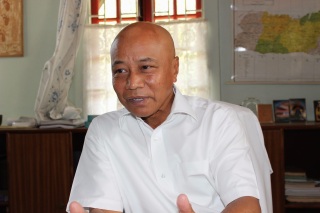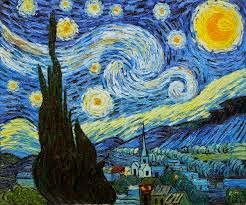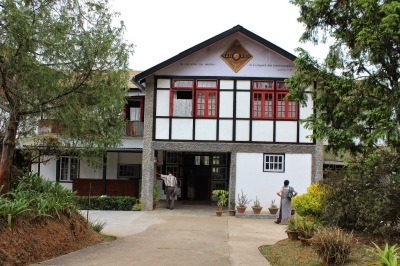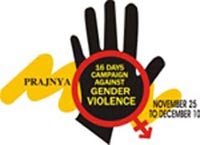4-May-2014
IT’S A MAD MAD WORLD! Or why should anyone ever exploit, abuse, neglect and ridicule “extraordinary people” coping with “extraordinary situations?” But that’s the general attitude of societies all around the world against people with mental illness.
In this rather insane situation, Dr. Sandy Syiem brings in balance and discards the notion that mental illness is perpetual and therefore anyone fighting with such ailments must be treated differently. He states: “mental illness is curable” and has been demonstrating it, with compassion and love, over several decades now.
After Dr. Syiem completed his doctorate from the All India Institute of Medical Sciences in New Delhi back in the 80s, wanted and like all his peers, to practise in a Metropolitan city or migrate abroad, but perhaps his fate was pre-destined.
Dr. Syiem recalls that when his brother expired after his studies, his parents insisted that he return home and so he did. After his return to Shillong Dr. Syiem took up a Government job and worked all over the State, looking after the mentally ill patients in different government institute, one such institute was infamously called the “Mawlai Mental Jail.”
“This was a high security prison for dangerous insurgents from Nagaland, which was later turned into an asylum for the mentally ill,” Dr. Syiem said.
He said that the mentally ill were cramped inside dark cells without ventilation and were treated more as animals than human beings. Dr. Syiem tried to bring in changes, but was stonewalled by bureaucratic red-tapism and so he quit and that’s when he decided to start working on his own and founded the San Ker Rehabilitation Centre.
 |
| Dr. Sandy Syiem |
The centre is an institute to look after the large number of “uncared mentally ill patients” of the State and is nestled amongst dense pine trees and beautiful surroundings at Mawroh.
“We began with the barest minimum in a cowshed and build the institute from scratch, taking loans in June 1990,” Dr. Syiem said. Now it is a 90 bed facility centre for male and female patients. Along with medication, there are group, individual and vocational therapy sessions. There is, moreover, the counselling sessions for the inmates as well as the families.
In the centre there is a basketball court and also some facilities to play sports. As soon as Dr. Syiem gets inside the centre the inmates surround him speaking about their problems, aspirations and desire to get back home. He consoles and advises each one of them, hugging them individually like a father-figure.
During this round of the centre, Dr. Syiem proudly displays some of the paintings that some of the inmates have created and are now mounted on the walls of the different corners of the institute. He says that many inmates are creatively inclined towards painting and they give colour to their emotions through their beautiful work. He also invites local artists and conducts painting workshops from time to time.
At the centre there are mentally ill patients from all over the region and speaks volume of the kind of importance state governments associate with mental illness. Take the case of a young rape victim from Assam. She has been handed over to the centre by a Government agency from the neighbouring State as there are “no facilities” to treat the girl in that State fighting mental imbalance after the rape.
Ironically, many of the patients who recover and are discharged are not taken back by their families. Geeta Roy, who was left at the centre years back now sits at the centre’s vocational training centre and makes beautiful flowers out of pine cones. “Mein ghar jana chati hu, legin koi mujhe lene nehi ata.” (I want to go home, but nobody from my family is coming to take me back), the frail woman says with remorse.
Dr. Syiem says that he has approached many times to find her family, but to no avail. There are many others who have been simply forgotten by the family. There is this stigma and people are sometimes ashamed to recognize one of their family members being mentally ill, Dr. Syiem says.
He adds that the society’s perception towards the mentally ill patient is stereotypical. Apart from the usual social stigma attached with mentally ill patient, women are worse off. Mentally ill women patients are victims of all forms of exploitation, including rape. He adds that in the first instance most of the mentally ill patients have undergone extreme physical and mental duress in one way or the other, resulting in their breakdown.
And when after recovery the society rejects them they become despondent and desperate further aggravating their situations. Moreover, with only a handful of NGOs working in this field and little Government assistance a large number of such patients ends up on the streets to be hounded and exploited from all quarters.
He further says that people generally don’t talk about mental illness. And they go for treatment quietly, be it at the hands of quacks or faith-healers. “They come here when all other options have been exhausted,” Dr Syiem said.
Interestingly, Dr. Syiem believes that awareness against mental illness is more pronounced in the rural sectors than in the urban areas. He says that in the villages it is not possible to hide anyone suffering from mental illness as the societies are very close-knit, but in the urban centres the case is the opposite.
 Meanwhile, there is no authentic data to number the mentally ill patients in the country. So policies and programmes are not accordingly formulated. Moreover, research and studies on mental illness is woefully poor and so is the awareness level amongst the people.
Meanwhile, there is no authentic data to number the mentally ill patients in the country. So policies and programmes are not accordingly formulated. Moreover, research and studies on mental illness is woefully poor and so is the awareness level amongst the people.
For example, mental illness is associated with violent behaviour, which is necessarily not correct. People coping with diseases like Schizophrenia and Maniac depression can be extremely thoughtful and intelligent.
On the legislation front, the Mental Health Act, 1987 (which replaced the Lunacy Act of 1912) came into force only in 1993. This Act’s objective is to protect the mentally ill from exploitation and abuse and provide them the rights to live as equal citizens.
But this Act has only been cosmetically implemented in States around the country. Experts say that this Act needs to be enforced in letter and spirit and needs further amendments to suit modern science and conditions.
Dr. Syiem has been a vocal advocate for bringing in changes in the State in terms of mental health care and says that the State Government needs to do more for the mentally ill in terms of budget allocation and legislation implementation. He points out that in the Meghalaya health budget, just 2 per cent is earmarked for mental health care and has been urging the Government time and again to increase this allocation.
For Dr. Syiem life has been a challenge, right from fighting societal stereotype, government indifference and on his personal front too as a Cancer survivor. Having being diagnosed with Cancer in 1998, he successfully fought it only for the disease to recur in 2001, which he again fought back and recovered. “This is not my fight but of many others and I believe there is a divine grace which has enabled me to do so,” Dr. Syiem says.
On his future plans the doctor has prepared an elaborate blue print for expansion of the centre, which is now run by a trust. There are plans to set up a 100 bedded centre with a hospice and other facilities. He says getting fund for the project is a constraint and has been running to the Government, philanthropic agencies and individuals, for help.
Centuries back, Vincent Van Gogh, whose mental instability is now legendary, with some instances being romanticized to a certain degree of sadism, could not sell a single painting during his lifetime as these were taunted and scoffed off as work of a “mad man!”
However Vincent Van Goh once stated “some of the colours I have depicted are not locally true, however they (colours) portray some inherent emotions.” Sadly, many short-sighted individuals and institutions of our present society are still being unable to see and understand these “beautiful minds.”
http://freedom24x7.blogspot.in/2014/05/sanity-in-insane-world-san-ker.html?view=classic





